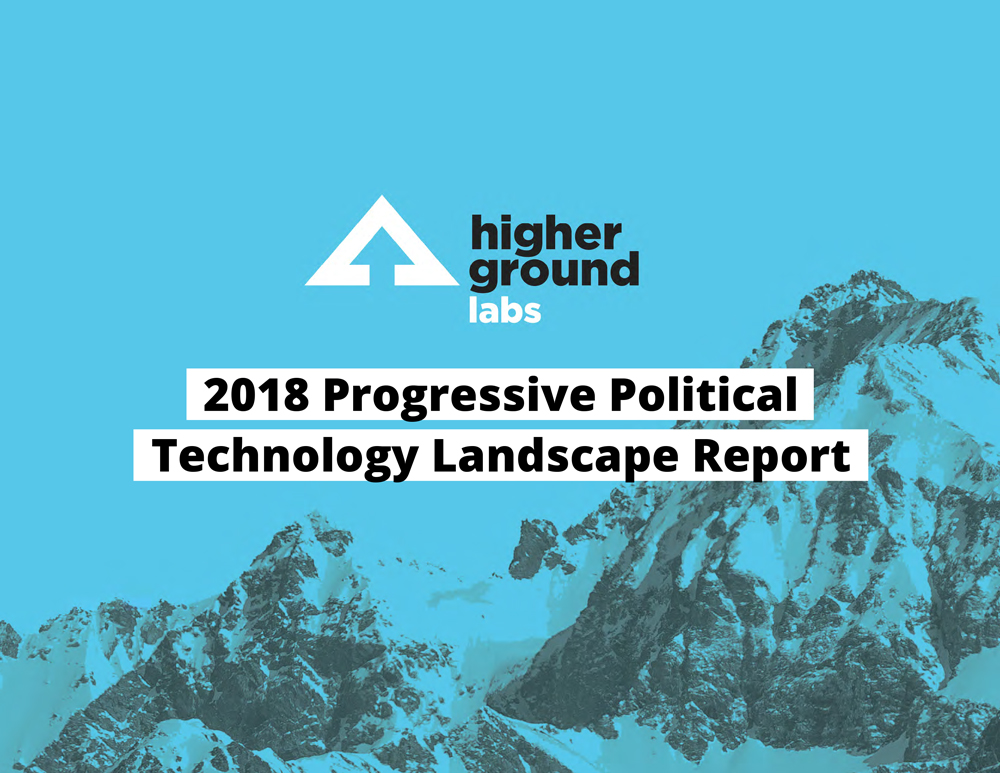Our team has worked over the past year to interview stakeholders, collect data, and organize our findings of the political tech sector. We’re excited to unveil our 2018 Political Tech Landscape Report, an in-depth look at the political technology market and what innovations we’re seeing in messaging & media, research, data analytics & modeling, and more. Our hope is to give the movement a shared language for the technology in our industry. Read the executive summary below and download the full report here: https://docsend.com/view/uq5qhhk
Higher Ground Labs has come to know the political technology market well through our collective experiences over the past decade in using, building, buying, and investing in political technology.We have seen hundreds of new tools, worked closely with dozens of founders, and collaborated with countless end-users to understand their options and needs.. This experience has made clear that we lack a common language to articulate our technical needs and then coordinate the resources necessary to meet those needs. Through this report, we seek to provide some of that clarity – for us, our partners, our investors, and practitioners to use as we build a strong market in the years to come.
We see eight categories that clearly define needs of the progressive community that can be met at least in part by technical solutions. These categories largely match the key functions of a campaign or organization. Some are flooded with innovation while others are starved necessary attention and creativity. We hope this definition of the space will offer common ground for the movement as we invest in existing solutions and seek new ones.
- Messaging & Media
- Research
- Data Analytics & Modeling
- Voter Engagement
- Volunteer & Activist Mobilization
- Fundraising
- Organizational Infrastructure
- Movement-wide Technology
This report defines each of those above eight categories, looks at some industry leaders, and discusses market opportunities. We also highlight observations that persist throughout the ecosystem. Some key conclusions include:
- The exciting entrepreneurial energy in Voter Engagement tools. We are gratified to see coming developments and funding in Data Analytics & Modeling, in particular aggregation and integration of voter data across channels, as well as improvements in voter file coverage.
- Progressives critically need to shift more Messaging & Media spend towards digital media, an evolution that would be enabled by faster and cheaper digital content creation. Across all forms of paid media, we also need to implement better targeting and efficacy measurement.
- In Organizational Infrastructure, we consistently heard demand for a campaign management dashboard with a dynamic overview of media, polling, field, and fundraising progress. Similarly, real-time tracking specifically for Voter Engagement contact would help field organizers manage all the disparate new Field Tools at play.
- The most limiting factor on Democrats’ ability to compete on data is technical training. In many areas, key technology challenges are about usability and integration, rather than cutting-edge sophistication.
- To make innovation a success, building technology is only one component of this future: progressive advocacy organizations, outside groups, and PACs must join with an energized and well-resourced Democratic Party at the national, state, and local levels, to test, learn, collaborate, train, and educate.
We view this report as a living document that will continue to evolve. Our hope is that the categories and the framework remain as institutional knowledge for our industry as the opportunities, gaps, and challenges continue to evolve.
To read more findings, download the full report here: https://docsend.com/view/uq5qhhk



